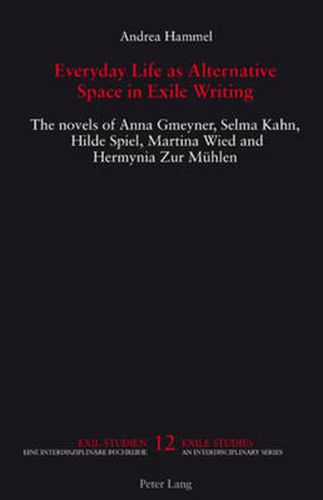Readings Newsletter
Become a Readings Member to make your shopping experience even easier.
Sign in or sign up for free!
You’re not far away from qualifying for FREE standard shipping within Australia
You’ve qualified for FREE standard shipping within Australia
The cart is loading…






This book is the ?rst comparative study of the novels written by ?ve German-speaking women - Anna Gmeyner, Selma Kahn, Hilde Spiel, Martina Wied and Hermynia Zur Muhlen - who had to ?ee National Socialist Central Europe. Gmeyner, Spiel, Wied and Zur Muhlen found refuge in Britain and thus added - together with male colleagues such as Stefan Zweig and Robert Neumann - an important but rarely investigated new dimension to the British literary landscape. The aim of this study is to reassess the women refugee writers’ narrative strategies and integrate their work within feminist literary studies. The author investigates the ?ve writers’ narrativisation of everyday life, used to subvert the dominant discourse, and their portrayal of the intersection between class, racial and gender oppression. She also shows their innovative ways of picturing the gendered tension between the experiences of exile and exile as a modernist metaphor as well as their search for ways to refute the Nationalist Socialist rewriting of history. The book situates the novels within the theoretical discussions surrounding exile studies, social history and women’s writing.
$9.00 standard shipping within Australia
FREE standard shipping within Australia for orders over $100.00
Express & International shipping calculated at checkout
This book is the ?rst comparative study of the novels written by ?ve German-speaking women - Anna Gmeyner, Selma Kahn, Hilde Spiel, Martina Wied and Hermynia Zur Muhlen - who had to ?ee National Socialist Central Europe. Gmeyner, Spiel, Wied and Zur Muhlen found refuge in Britain and thus added - together with male colleagues such as Stefan Zweig and Robert Neumann - an important but rarely investigated new dimension to the British literary landscape. The aim of this study is to reassess the women refugee writers’ narrative strategies and integrate their work within feminist literary studies. The author investigates the ?ve writers’ narrativisation of everyday life, used to subvert the dominant discourse, and their portrayal of the intersection between class, racial and gender oppression. She also shows their innovative ways of picturing the gendered tension between the experiences of exile and exile as a modernist metaphor as well as their search for ways to refute the Nationalist Socialist rewriting of history. The book situates the novels within the theoretical discussions surrounding exile studies, social history and women’s writing.